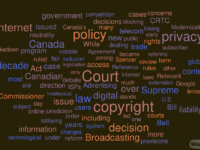Over the past month, I’ve had the opportunity to appear before two House of Commons committees – International Trade and Industry, Science and Technology – to discuss the digital law and policy implications of the Canada-U.S.-Mexico Trade Agreement. My opening remarks were nearly identical and focused on four issues: copyright term extension, the cultural exemption, privacy and data protection, and Internet platform liability. The Standing Committee on International Trade yesterday released its report on Bill C-4, the bill implementing CUSMA, with no changes, meaning that lobbying pressure to immediately extend the term of copyright was rejected.

Wiertz Sebastien - Privacy by Sebastien Wiertz (CC BY 2.0) https://flic.kr/p/ahk6nh
Privacy
“We Don’t Have Any Specific Analysis”: CUSMA Negotiators Surprising Admission On Key Privacy Issues
Earlier this week, the Standing Committee on Industry, Science and Technology began hearings on Bill C-4, the bill designed to implement the Canada-U.S.-Mexico Trade Agreement. I appeared before the committee to discuss digital issues (more on the appearance in an upcoming post), but just prior to my panel, the team of lead negotiators from Global Affairs took questions from Members of Parliament.
The questioning opened with a stunning exchange between Conservative MP Michelle Rempel Garner and chief negotiator Steve Verheul on the privacy analysis (or lack thereof) conducted by Canadian officials:
The LawBytes Podcast, Episode 37: The Future of Privacy in Canada – A Conversation with Privacy Commissioner of Canada Daniel Therrien
The Lawbytes podcast resumes for another season with a special episode on privacy as I’m joined on the podcast by Daniel Therrien, the Privacy Commissioner of Canada. Commissioner Therrien recently used Data Privacy Day to deliver a speech at the University of Ottawa focused on privacy reforms and a new consultation on AI and privacy. He joined me on the podcast to talk about his term as commissioner, the major challenges he’s faced, the state of Canadian privacy law, and the prospect for reform. Following our conversation, the podcast features audio of the Commissioner’s bilingual speech at the law school.
The Canadian Digital Law Decade: The Ten Most Notable Cases, Laws, and Policy Developments
As the decade nears an end, there have been no shortage of decade in review pieces. This post adds to the list with my take on the most notable Canadian digital cases, legislative initiatives, and policies of the past ten years.
1. The 2012 Copyright Modernization Act
The enactment of the 2012 Copyright Modernization Act in June 2012 brought more than a decade of copyright reform battles to a close and immediately ushered in a new round of debate and lobbying that continues until this day. The reform package was the largest copyright overhaul in years, featuring everything from an expansion of fair dealing (including education as a fair dealing purpose) to protection for non-commercial user generated content to the codification of the notice-and-notice system to legal protection for digital locks. The reforms also legalized longstanding practices such as time shifting, set a cap on liability for non-commercial infringement, and established a new provision to target websites that enable infringement.
The LawBytes Podcast, Episode 36: The Year in Canadian Digital Law and Policy
The past year has been an incredibly active one for Canadian digital law and policy with important Supreme Court cases, legislative proposals, committee reports, expert panels, and political promises to reform existing laws and regulation. For this final Lawbytes podcast of 2019, I go solo without a guest to talk about the most significant trends and developments in Canadian digital policy from the past year and think a bit about what may lie ahead next year. I focus on five issues: the “euro-fication” of Canadian digital policy, the debate over the competitiveness of the Canadian wireless market, the many calls for privacy law reform, the future of Canadian copyright reform, and the review of Canadian broadcast and telecom law.











